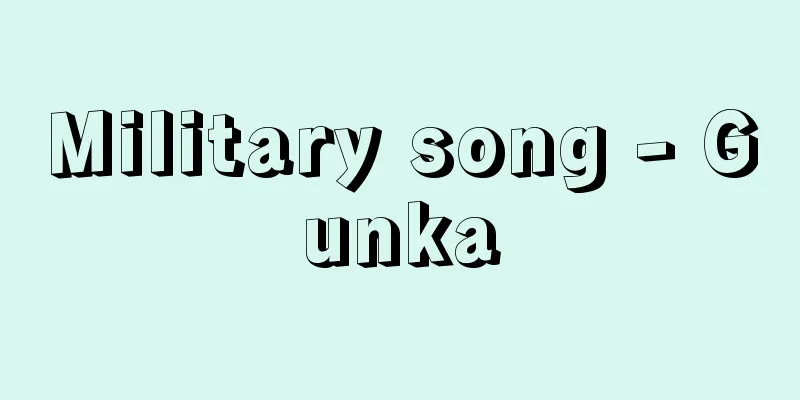Military song - Gunka

|
Basically, military songs are songs sung by soldiers while marching, and according to this definition, military songs can be said to exist in almost every region of the world and in every era. Furthermore, songs related to combat are found among many ethnic groups. However, in general, this term refers to songs that were created in Japan after the Meiji period to boost military morale and promote the patriotic spirit of the people. The first Japanese military song in this sense is said to be "Tonyare-bushi" (1868), famous for the opening line "Miya-san Miya-san Ouma no mae no mae...". This song was sung by the Eastern Expeditionary Forces on their march to Edo, and while it retains the style of Edo-period folk songs, it also shows the influence of Western marches. This song was widely circulated among the people in numerous parodies, due to the hopes for the Meiji Restoration. However, as hopes for the Restoration government soon turned disillusioned, people began to use Edo-period folk songs to criticize the government. It is hard to imagine the Ministry of Education creating and designating elementary school songs without this background, but the aspect of it being a means of controlling the people's thoughts is also clearly evident in subsequent military songs. "Tonyare-bushi" itself is said to have been written by Shinagawa Yajiro of Choshu and composed by Omura Masujiro, so it was originally an official military song. As the Sino-Japanese War approached, the number of military songs rapidly increased. Representative songs include "Come, Come" (words by Toyama Masakazu, music by Izawa Shuji, 1888) and "The enemy is tens of thousands" (words by Yamada Bimyo, music by Koyama Sakunosuke, 1891), which are written in the so-called "yonabuki" pentatonic scale, and many military songs thereafter were based on this scale. This scale was also widely used in elementary school songs, and played a role in competing with people's sense of sound up until the Edo period, stifling people's creativity. However, the song that became most popular during the Russo-Japanese War was "Senyu" (1905), which was not an official military song, nor did the lyrics sing of the spirit of "loyalty to the emperor and patriotism" and has a modal melody, giving a sense of the strength of the musical culture that people shared. Furthermore, hardly any military songs were created during the Taisho period. Then, in the Showa period, around the time of the start of the Sino-Japanese War (1937), many military songs began to be created again, but official military songs were not well received by the people, and instead, soldiers widely favored works by private composers known as "militaristic songs," such as "Song of the Bivouac," "Praying at Dawn," and "Father, You Were Strong." In the West, there are songs called soldiers' songs, such as "God Bless America," which was widely sung in the United States during World War II. The French national anthem, "La Marseillaise," was also originally sung by soldiers. [Ryūji Uta] "The Definitive Collection of Japanese Military Songs" by Keizo Horiuchi (1969, Jitsugyo no Nihon Sha) Source: Shogakukan Encyclopedia Nipponica About Encyclopedia Nipponica Information | Legend |
|
基本的には兵士が行軍しながら歌うものであり、この定義によると、おそらく世界中のほとんどの地域、各時代に、軍歌に属するものが存在しているといえる。また、戦闘行為にまつわる歌唱は多くの民族にみいだされる。しかし一般にはこの語は、わが国において明治以降につくられた、軍隊の士気を高め、また国民の愛国精神を発揚するための歌をさしている。 この意味でのわが国最初の軍歌は「宮さん宮さんお馬の前で……」の歌い出しで有名な『トンヤレ節』(1868)とされる。これは東征軍が江戸への進軍中に歌ったもので、江戸期の俗謡調をとどめながらも、欧米の行進曲の影響が認められる。この歌は、明治維新への期待感から数多くの替え歌となって人々の間に広まった。しかし、維新政府に対する期待がすぐに幻滅となると、人々は江戸期からの俗謡で政府を批判するようになる。こうした背景抜きには、文部省の小学唱歌制作、指定は考えられないが、国民の思想統制の手段としての側面は、その後の軍歌にも色濃く表れている。『トンヤレ節』自体、長州の品川弥二郎(やじろう)作詞・大村益次郎(ますじろう)作曲であるといわれており、もともと官製軍歌なのである。 日清(にっしん)戦争が近づくと軍歌は急増する。代表的なものとして『来(きた)れや来れ』(外山正一(とやままさかず)作詞・伊沢修二作曲、1888)、『敵は幾万』(山田美妙(びみょう)作詞・小山作之助作曲、1891)があげられるが、これらはいわゆる「ヨナ抜き」の五音音階でできており、以後多くの軍歌がこの音階によるものとなる。この音階は小学唱歌でも多用され、江戸期までの人々の音感覚に対抗し、人々の創造性を萎縮(いしゅく)させる役割を担った。しかしその後の日露戦争期にもっとも流行した『戦友』(真下飛泉(ましもひせん)作詞・三善和気(みよしわき)作曲、1905)は、官製軍歌ではないうえ、「忠君愛国」の精神を歌う歌詞内容ではなく、また陰旋法的な旋律であり、人々の共有してきた音楽文化の根強さを感じさせる。さらに、大正期にはほとんど軍歌らしきものはつくられなかったのである。そして昭和になって、日中戦争開始(1937)前後からふたたび軍歌が多くつくられるようになってからも、官製軍歌はあまり人々に受け入れられず、『露営の歌』『暁に祈る』『父よあなたは強かった』などの「軍国歌謡」とよばれた民間作曲家の作品が広く兵士にも好まれた。 なお、欧米でソルジャーズ・ソングsoldiers' songなどとよばれるものがあり、第二次世界大戦中にアメリカで広く歌われた『ゴッド・ブレス・アメリカ』などがその例である。また、フランス国歌となっている『ラ・マルセイエーズ』も、もともと兵士たちが歌ったものであった。 [卜田隆嗣] 『堀内敬三著『定本 日本の軍歌』(1969・実業之日本社)』 出典 小学館 日本大百科全書(ニッポニカ)日本大百科全書(ニッポニカ)について 情報 | 凡例 |
>>: Order of Merit - Order of Merit
Recommend
Introduction, development, twist and conclusion
A term used in the construction of Chinese poetry...
Otomihi Shrine
A shrine in Funabashi City, Chiba Prefecture. &quo...
CSD
《 cold shut down 》⇒Low temperature shutdown Source...
nektar
…Etymologically, it means “immortality.” Usually,...
Sakai Hōitsu
A painter from the late Edo period. His name was ...
Haplotaxidae
…There are about 20 species in Japan, with the cr...
Public speaking - Public speaking
〘noun〙① (━suru) To do something widely. In particu...
Anticipation
...An antiphonal tone that moves in the opposite ...
Near and Middle East
… [Implications for the Middle East] It was after...
Dallas - Daras (English spelling)
A commercial and industrial city in northern Texa...
Morador (English spelling) [Portugal]
Meaning "resident." Refers to slave farm...
The Kioizaka Incident
In 1878 (Meiji 11), Councillor and Minister of Ho...
Toi [town] - Toi
A former town in Kameda County, Hokkaido. Located ...
Thalictrum filamentosum (English spelling) Thalictrum filamentosum
…[Michio Tamura]. … *Some of the terminology that...
Waagenophyllum
…In Japan, characteristic species and genera have...









